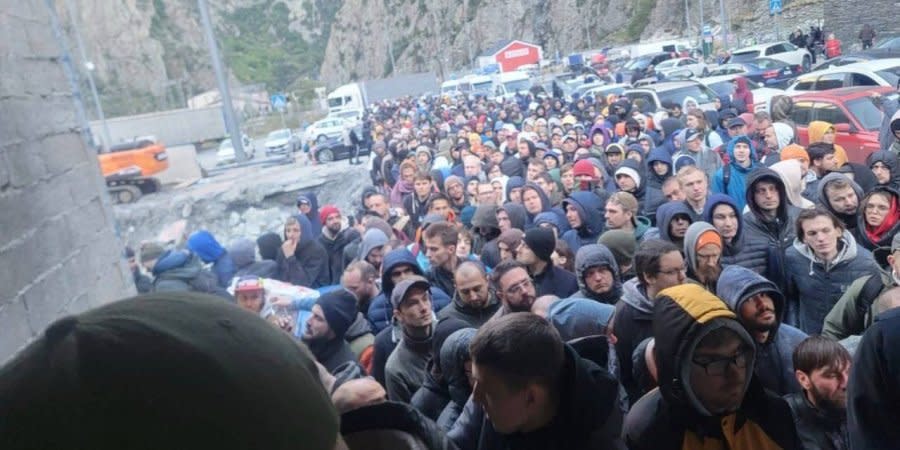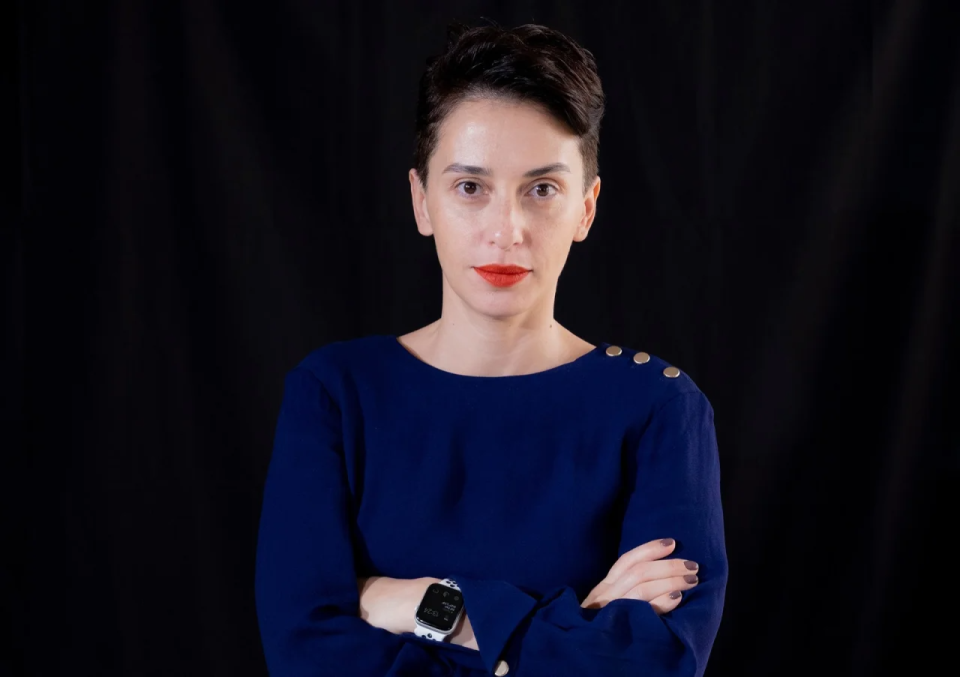Georgian journalist the on influx of Russians dodging mobilization

To find out what Georgians expect from the Russians who are so desperate to get into their country, and how they feel about Russian migrants who have already moved to Georgia, NV spoke to Marta Ardashelia, a Tbilisi resident who works as editor-in-chief of the independent Georgian publication Sova News.
The following is a transcript of Mrs. Ardashelia’s reply, edited for readability and clarity.
This is the second wave of migration from Russia to Georgia. But its scale, of course, is impressive and cannot but frighten Georgians, as we are still at war with Russia. The meme, which has been viral all these days on social media, speaks for itself: a comparison of 2008, when a column of tanks was coming out of the Roki Tunnel, and our time when a huge number of cars with Russians gathered near Verkhniy Lars.
Read also: Russia to deploy mobilization point on the Russian-Georgian border
The attitude of local residents to this is ambiguous. We can say that public opinion in Georgia is divided into three positions. The first one is to close the border and not let Russians in. The motivation, in this case, is as follows: these are people who did not leave Russia on Feb. 24, it was normal for them to live there all these seven months. The issue is aggravated by the fact that we read in the chats dedicated to Verkhniy Lars recommendations such as "when entering the territory of Georgia, remove St. George ribbons and symbols Z and V from your cars, otherwise there will be problems". These people do not even know that there was a war between Russia and Georgia in 2008 and they advise each other, "if you are asked, do not forget to say that Abkhazia and South Ossetia are Georgia, because there is the same story as with Crimea". These are the sort of statements that we read in their chats. And this, of course, causes discontent.
The second position is softer. Its supporters believe that it is better for us to accept Russians now than for them to go to war against our brothers-Ukrainians; let them leave Russia and go somewhere else. But there is one counterargument here. As we observe the rise in prices, the cost of housing that Russians rent, and their lifestyle, the first wave were ardent anti-Putinists and quite wealthy people: Muscovites, St. Petersburgers and others who did not want to live under sanctions. But in the category that is now coming to us, there are different people. Perhaps they do not have the means to go somewhere else – to Europe or other countries where Russians are welcome. That is, we cannot be sure that these people will not settle in Georgia. And you know that Georgia is a rather small country. We are 3.5 million people, many of whom are now living abroad. As British journalists wrote a few months ago, "Tbilisi is Moscow with khachapuri", the number of Russians walking the streets of the city is striking. And, of course, the situation will get more complicated.
The third part of the Georgian public believes that there is no need to panic: Russians will rent our apartments, buy our products, and for some time we will have a good income. So let's seize the moment.
In general, you can hear different opinions. But everyone is cautious because no one here in Georgia is used to trusting Russia. Many NGOs are already coming up with various initiatives: to introduce a visa regime with Russia, prohibit issuing residence permits to Russians who are massively buying apartments and land plots here, or complicate the conditions of stay in Georgia. After all, now Russians can stay in Georgia without a visa for a year, and then easily renew this right, crossing, for example, the Georgian-Armenian border and returning back. All this is nice and easy for Russians.
Read also: Czech president calls for Prague to accept Russians fleeing mobilization
As for the version which is now being actively circulated in Ukraine and the source of which is Nona Mamulashvili [opposition MP, who announced the intentions of the Georgian authorities to close the borders for Russians who may be subject to mobilization by age], I think it is very difficult to imagine that Georgia would impose any restrictions on Russians. This is because the current government of the ruling Georgian Dream party came with a promise to establish relations with Russia. Accordingly, if Russia allows these people to leave, Georgia will not contradict the Kremlin. Therefore, it all depends on Moscow's decision.
Georgians themselves are a quite peaceful and tolerant people, due to the ethnic diversity that has long existed here. But the situation with Russia is quite different. This is a country with which we have been at war for a long time. Now the conflict is in a cold phase (despite the fact that our residents are regularly abducted from the "border" villages), and more than 30 years have passed since its beginning. Georgians are somewhat tired of it. Many wanted to take a breather and just decided to live their lives as calmly as possible. For some time, this worked. But the war with Ukraine has strained a nerve that we wanted to forget about; it has stirred up all of these emotions and now the public mood is tenser than ever before – everyone expects that there is some limit to what is happening. However, the situation is only getting worse by the day.

Although some Russians – and I even know them – are quite polite and well-mannered people, there are those who do not know how to behave politely and courteously in other countries. And I can safely predict that later there will be some clashes and tensions with the locals. So far there has been no such thing because the first wave consisted mainly of refined Moscow and St. Petersburg intellectuals, anti-Putinists, and oppositionists. But now the real Russia is coming to us – a little bit thuggish, the average Joes who do not want to serve in the army, and there is no ideological or moral component in their escape. Georgians, on the other hand, do not intend to tolerate rudeness and all sorts of Z's.
There were, of course, some domestic misunderstandings before. For example, Russians have a habit of taking their rubles everywhere. And when someone does not accept rubles, because the law of an independent country prohibits paying with someone else's currency, they are wildly surprised. This speaks about the attitude: they would not go to London to pay with rubles, but Georgia is "some former province", so they might as well try. Some people are still indignant why the menu is not in Russian.
And there was also a big scandal when one of the fashionable Tbilisi bars – Dedaena — introduced a so-called visa for Russians: at the entrance they had to fill out a questionnaire, signing that Russia is the occupier, that Abkhazia and all the occupied territories of Ukraine do not belong to Russia, after which the visitors got a stamp saying "Putin is a d*ckhead". After passing all these procedures, they were allowed to the bar. This caused great discontent. The Russians claimed it was segregation, and oppression of people on ethnic grounds. But I believe that such a discussion has the right to exist. Just as there can be such acts by people who believe that their country was oppressed by Russia.
Read also: FSB sends armored vehicles to checkpoint where Russians are trying to flee to Georgia
As for the impact on the economy, with the influx of Russians, of course, prices have risen – for example, for housing. Because of this, students who come from Georgian countryside where the standard of living is not as high as in Tbilisi have huge problems. They cannot compete with the prices that are now set for Russians. The system of hostels in Georgia, unfortunately, died with the Soviet Union. And those dormitories that are available are still occupied by refugees from Abkhazia and South Ossetia, so it is impossible to accommodate students there.
Prices for services – for example, manicures – have also increased to the average between Tbilisi and Moscow. Food has also risen in price, but this, I think, is part of a global trend.
Russians themselves feel uncomfortable with the obvious support expressed by Georgians towards Ukrainians. Ukrainian flags are everywhere here. And I came across messages in the online chats of visiting Russians like "there are Ukrainian flags everywhere and, of course, this leaves a bad taste in the mouth".
Read also: Russians can overthrow Putin’s regime, says Lithuanian foreign minister
Besides, the Georgian audience has not lost interest in covering the war in Ukraine — it is a topic they follow as their own. I, for one, also work on television, and in our weekly analytical program, in addition to the analysis of Ukrainian events, we always give news from the front. Such reports always draw huge views and a lot of comments. People are actively watching it. Sometimes we even note with tears behind the smile that now we know all the settlements of Ukraine by heart. In general, support for Ukraine in Georgia is noticeable, and it is very honest, and very sincere.
Read the original article on The New Voice of Ukraine
